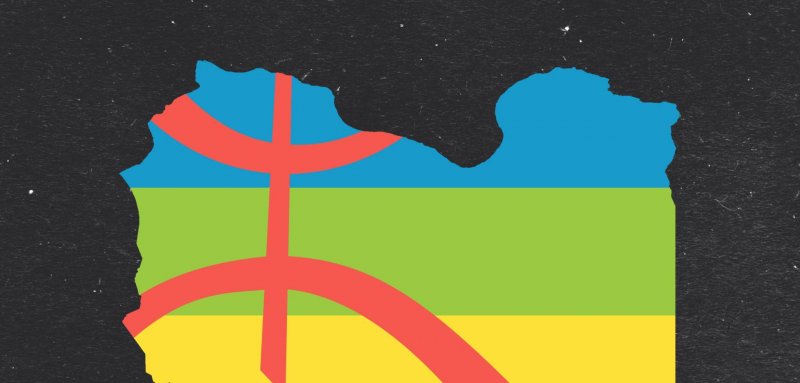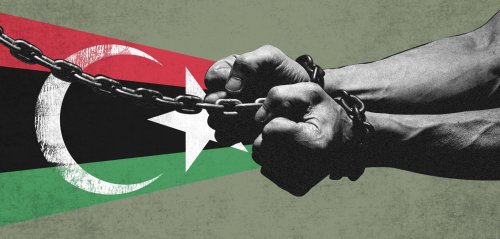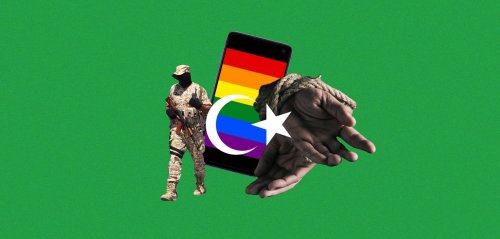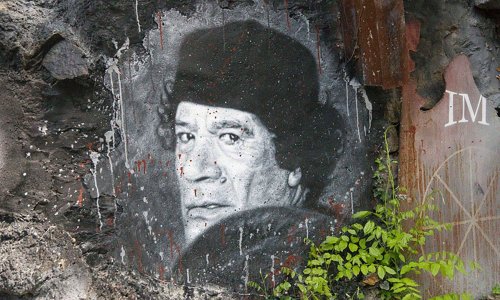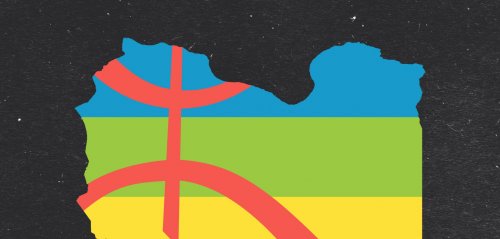I was born Berber by pure luck. I left my hometown and headed North, where Europe is visible in the far north, extending its arms to North Africa, to find myself by pure luck living in Germany, where a local preacher gave Friday sermon in Amazigh. This all happened to me as I started a new life, a life instead of the one I had lost in Libya. I found myself having to take a driving test and in this instance, I could actually take the theoretical exam in my second mother tongue, Arabic. Germany, where almost everyone speaks German, Germany, where they distribute to Arabic-speaking patients (in the hospital where I am training) detailed pamphlets in their mother tongue, of the surgical procedure they are about to undergo, since most of them cannot speak any other language.
The last part of the story, and I have no justification for delving into its details, is that now I live in a country where the idea of citizenship is respected, and above all the idea of being human and of having natural rights even if you are not a citizen since a state is by all and for all.
This is why we need to go back to the beginning of the story when I was born Berber by chance. I forgot to tell you that I speak two languages almost from birth. One was popular and loved by God and the ruling regime and the other was also loved by God but did not elicit quite the same feeling from the regime.
In Libya, speaking Amazigh was an offense in the age of the republic of the single colored flag but it wasn't an offense that rested heavily on the shoulders of Amazigh speakers as the grip of the police state on their lives was the same as that on other Libyans. Speaking Amazigh wasn't even really their offense as truth be told, most of them didn't care about it, speaking Amazigh was not something its speakers cared about.
I speak Arabic and #Amazigh almost from birth. One was popular and loved by God and the ruling regime and the other was also loved by God but did not elicit quite the same feeling from the regime.
The #Amazigh speaking community itself, because of its fear of the regime and because of the belief in Abdel Nasser's ideas sometimes would marginalize those who asked for the language to be respected and taught, voluntarily using Arabic instead.
In a village in the mountain there is an Amazigh-speaking political prisoner who spent more time in Gaddafi's prisons than Nelson Mandela in the prisons of apartheid and there is another Amazigh speaking prisoner who has been imprisoned for 30 years and no-one knows where he is to this day, both are political activists but they were not concerned with Amazigh, both of them (whose names we will not mention) belonged to the political Islam movement, a movement which is more ferociously Arab centric and authoritarian than Qaddafi's regime. Perhaps, these are two simple examples that prove that the speaking Amazigh in itself was not enough to provoke the ire of the regime at the time.
An Amazigh speaking politician said in a video after the death of Gaddafi (and he is a Muslim Brotherhood supporter) that the idea of “revolutionary committees” should be replicated in support of the party's ideology, whose members believe they have the voice of Allah under their hats. This is another Amazigh-speaking politician who does not carry the burden of the Amazigh language on his shoulders.
Amazigh speakers in Libya were present in all state agencies, revolutionary committees, security services, intelligence services, universities, schools, hospitals. They were almost everywhere, too, at popular congresses, police stations, in the queues for the co-op, in the petrol stations with the cheapest petrol in the world, in the sick houses and in the graveyards as well. There was an injustice in the reconstruction of the majority of Amazigh speaking cities, but this injustice was fair, especially when we know that Tripoli and Benghazi were the last cities built in Libya during the reign of Italo Balbo, the Italian governor before the fascists lost World War II.
Libya is a country where the regime, for almost half a century, has only built dreams, a few cement blocks, and the great industrial river.
As for the Amazigh language, it is another matter: the Amazigh language that I strived to defend as a living language in the reality of the Libyan people, or at least in the reality of its native speakers, as a local language, like any other local language like Arabic or Tedaga, for it be used by anyone, whether in singing, composing, publishing, forgery, and lying, a language that can be used to convey thoughts and feelings and a mean to establish the idea that individual rights are not granted according to the whims of the ruling authority or even the majority.
This involvement cost me a great deal, I rarely ventured out of Tripoli where I was born and raised but when I did, I eventually discovered that my name was on the lists of intelligence services around the Arab world, for they closely coordinate with each other. In Cairo airport just before Mubarak was toppled, I was stopped for several hours by security who wanted to investigate the reason for my visit and if I belonged to the Muslim brotherhood and in Morsi's time the same thing occurred even though I was with a delegation from the ministry of culture as a representative of the first-ever magazine in Amazigh in Libya's modern history. Since I was its editor in chief, I was stopped again even though the Muslim brotherhood were now the ones in power, the questions changed but the situation stayed the same.
But to return to the past, the Amazigh language was once cursed in public media and was considered a dangerous evil, a French colonialist conspiracy sometimes and a Zionist one at others. The Amazigh speaking community itself, because of its fear of the regime and because of the belief in Abdel Nasser's ideas sometimes would marginalize those who asked for the language to be respected and taught, voluntarily using Arabic instead.
Said Saif Al Mahrouq for example was a Libyan writer interested in Amazigh culture and language during the genesis & rise of Arab nationalism in North Africa. He died in 1994 after an accident that left him paralyzed for 10 years. He died alone in Tripoli after being rejected by his native city and his native tongue to the extent there was no-one to carry his coffin to his grave as is customary, for he used Amazigh through his muted poetry, leading to the imprisonment of a music band after his death simply because they recited his Amazigh poems in a rather crudely produced tape called “Libya 2000”.
“There is no difference between Berber and Arab- we are all Libyans in this nation” Mahrouq wrote this in a work that was published after his death and this sentence summed up my understanding of the subject. Libya should be a nation for everyone and the belief in Amazigh nationalism does not differ from believing in Arab nationalism that calls for ownership of the present and the future also. And this was the point of contention between me and what was called "The Berber Baath party" that worked illicitly on forbidden websites. A lot of their intentions were good but it was a response to Arab nationalism. They were a group of activists who were very impressed by the nationalism of the Algerian tribes and who hated the lie of a united Arab nation but rather clung to the illusion of another united nation that of "Tamazgha" which came with another problem that a few insisted on: linking the Amazigh with the Ibadi sect which turned it into this peculiar sectarian and linguistic mix that no-one in Libya knew existed until the fall of Qaddafi's regime.
The majority of Libyans before the February civil war were not aware of the existence of followers of the Ebadi sect in Libya. There were thousands of them and they did not know or perhaps care about anything Amazigh.
I pursued this illusion of a parallel nationalism, to begin with, but this did not last long as I began to draw the line between the idea that I was speaking a language different from my neighbours, and the fact that we would remain neighbours because of our geographical proximity. Here I began to cautiously hint at the idea of the Libyan nation in my articles and how the state should be neutral towards the ideas, beliefs and identities of its citizens, and the idea of secularism as well, which Amazigh could have been the wider door to open up & enshrine idea of co-existence and a state for all. But this door is half shut, a ruthless national antagonism, the inherited tribal animosity resulting from a previous civil war a hundred years ago, and the slogans of religious fanaticism at other times aborted the dream of a Libyan state, turning into a swamp filled with heavily armed charities.
Raseef22 is a not for profit entity. Our focus is on quality journalism. Every contribution to the NasRaseef membership goes directly towards journalism production. We stand independent, not accepting corporate sponsorships, sponsored content or political funding.
Support our mission to keep Raseef22 available to all readers by clicking here!
Interested in writing with us? Check our pitch process here!
